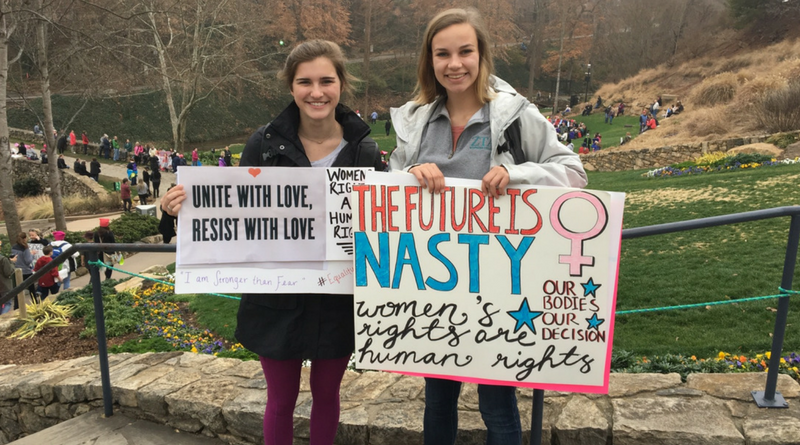By: Katherine Waters, Staff Writer
On Jan. 20, the day after the inauguration of President Donald Trump, millions of people congregated around the world for the first-ever Women’s March on Washington, a protest supporting equal rights for women. Among the crowds in Washington D.C., where the primary march was held, Wofford students joined in on the demonstration.
Helen Birdsong ’17 says that her family served as the inspiration for her attending the march.
“I chose to participate because I fully support equal rights for women and I have been fortunate enough to have opportunities that aren’t available to all women,” she says. “I also chose to march in support of the women in my family who have faced and fought for gender equality.”
Although feminist protests date far back in time and include the suffragist movement of the early 1900s and equal rights protests held in the 1960s and 1970s, many March on Washington attendees felt that the policies of the newest president threaten the equal treatment of women.
“The march on D.C. was my first protest, but I have been involved in others since,” says Annie McDermott ’17. “I chose to participate in this march because I felt it was my obligation as a citizen and a human being to stand up and fight against hatred, bigotry and the regressive policies of Donald Trump.”
The march was held the day after Trump’s election to make a statement about his plans for his time in office. But the march was not limited only to liberal voters or Trump’s opponents. Dr. Sally Hitchmough, English professor and co-coordinator for the Gender Studies Program, says that the support for feminism is held by people all over the world.
“The fact that women marched in the streets in many countries and not just in the USA is obviously tremendously significant: you can’t dismiss these marches as party politics,” she says. “America has elected a leader who speaks in demeaning terms about women, and that’s a matter of concern across the globe.”
Birdsong agrees, saying that the interest in equal rights for women is increasing worldwide. At the same time, however, the march incited some worry about how far gender equality must go until both men and women are treated the same.
“From what I saw at the march in D.C., there is a significant amount of people who are concerned about and vigilant towards the threat to women’s rights. The sheer volume of protests and marches across the globe also shows an increase in awareness of and support for equal rights for women,” says Birdsong. “Sadly, the march illustrated that while we have come a long way in the fight for women’s rights, as a country, we are not there yet.”
McDermott says that the march is a starting point for more activist movements in the future. Trump’s election has caused more people to want to speak up about their personal beliefs and she believes that this protest has motivated them to become even more active.
“This march is already starting a movement of political activism,” she says. “A march to protest a newly inaugurated president with a crowd that exceeds the attendance at the inauguration clearly shows that something is wrong and people are passionate about changing it. I am excited and encouraged by the march and the political discourse and involvement it has generated so far and I think there is only more to come.”






























